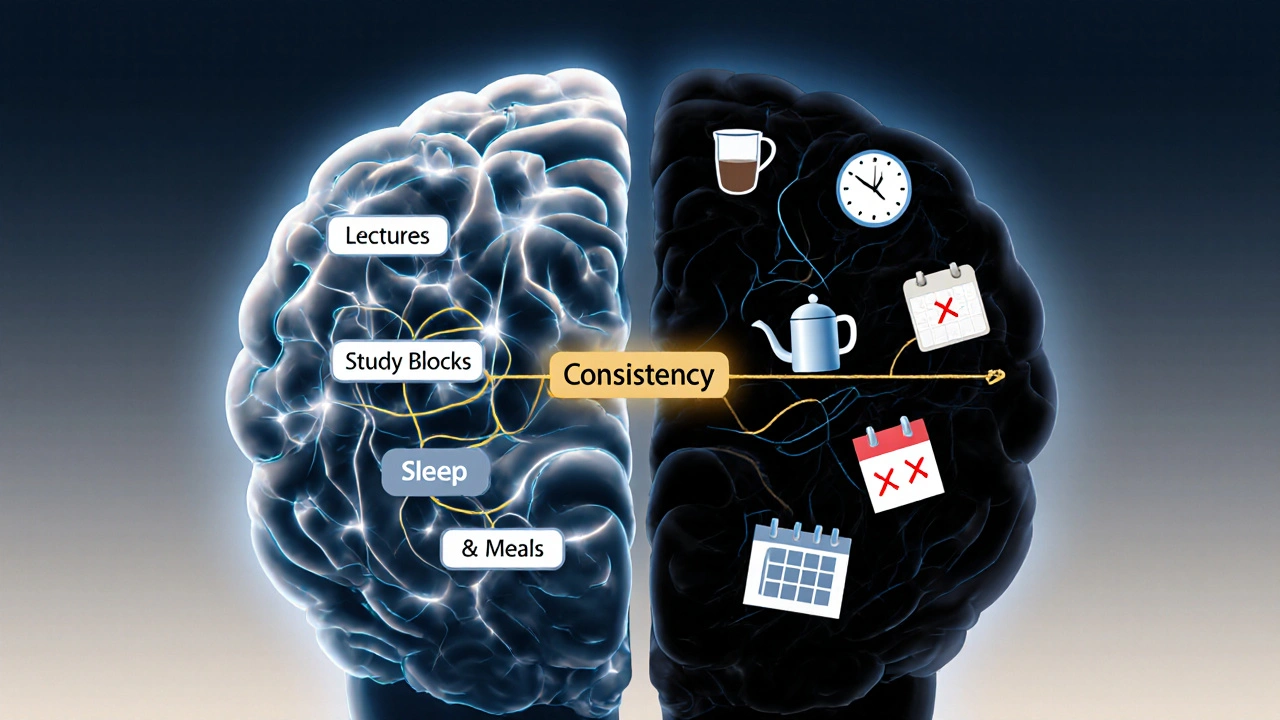
Trying to juggle lectures and a night shift isn’t just tough-it’s exhausting. Every week, students across the UK show up to class with dark circles, coffee in hand, and a schedule that looks more like a puzzle than a plan. If you’re working evenings or weekends while studying, you’re not alone. But you don’t have to burn out. The key isn’t working less-it’s working smarter.
Know Your Body’s Limits
Your brain isn’t a machine. It needs sleep, recovery, and consistency. Research from the University of Oxford found that students working more than 20 hours a week while studying full-time were 40% more likely to drop a module or fail an exam. That’s not because they weren’t trying. It’s because their bodies couldn’t keep up. Start by tracking your energy for a week. Write down when you feel alert, foggy, or drained. Most people have one or two peak hours during the day. If you’re a morning person, don’t schedule your heaviest lecture at 3 p.m. If you’re a night owl, don’t book a 7 a.m. shift right after a late-night class. Your schedule needs to match your biology, not the other way around.Map Your Week Like a Pro
Grab a calendar-physical or digital-and block out everything. Not just lectures. Not just work. Everything: commute time, meals, laundry, gym, even downtime. Students who plan their week in 30-minute chunks are 65% more likely to stick to it, according to a 2024 survey by the National Union of Students. Here’s what a realistic weekly layout looks like for a student working 16 hours a week:- Monday: 9 a.m.-12 p.m. lecture, 1 p.m.-5 p.m. study block, 7 p.m.-11 p.m. shift
- Tuesday: 10 a.m.-1 p.m. lecture, 2 p.m.-4 p.m. library time, 8 p.m.-10 p.m. rest
- Wednesday: 9 a.m.-12 p.m. lecture, 1 p.m.-3 p.m. group project, 6 p.m.-10 p.m. shift
- Thursday: 11 a.m.-2 p.m. lecture, 3 p.m.-5 p.m. review notes, 7 p.m.-9 p.m. free
- Friday: 9 a.m.-1 p.m. lecture, 2 p.m.-4 p.m. errands, 5 p.m.-1 a.m. shift
- Saturday: 10 a.m.-1 p.m. study, 2 p.m.-6 p.m. sleep, 7 p.m.-11 p.m. shift
- Sunday: 10 a.m.-12 p.m. weekly review, 1 p.m.-4 p.m. meal prep, rest the rest of the day
Choose the Right Job
Not all student jobs are created equal. A campus library assistant who works 9 a.m.-4 p.m. Monday to Friday is easier to sync with lectures than a supermarket cashier who rotates between 6 a.m.-2 p.m. and 10 p.m.-6 a.m. Look for jobs with these traits:- Fixed shifts (no rotating schedules)
- Noticeable breaks between shifts (at least 10 hours off)
- On-campus or within walking/biking distance
- Employers who know you’re a student and respect deadlines

Protect Your Sleep Like Your Grades Depend On It
They do. Sleep isn’t downtime. It’s when your brain files away everything you learned. Skipping sleep to cram for an exam doesn’t help-it hurts. A 2023 study from University College London showed students who slept less than 6 hours on three or more nights a week scored 22% lower on average than those who got 7+ hours. Here’s how to protect your sleep:- No screens 45 minutes before bed. Use blue light filters if you must.
- Keep your room cool (18°C is ideal).
- Wear the same pajamas every night. Your brain picks up routines.
- If you work nights, use blackout curtains and a white noise machine. Even daylight can mess with your rhythm.
Use Technology, Don’t Let It Use You
Apps like Google Calendar, Notion, or even the built-in Apple Calendar can be lifesavers. Set reminders for:- Shift start/end times
- Lecture locations
- Assignment deadlines
- When to eat
- When to stop working

Communicate Early and Often
Your lecturer won’t know you’re working unless you tell them. Same with your employer. Don’t wait until you’re falling behind. At the start of term, send a short email to your course coordinator:Hi [Name], I’m working [hours] per week at [job] and wanted to let you know in case I need to miss a session due to shift conflicts. I’m committed to keeping up with readings and assignments and would appreciate any flexibility with deadlines or recorded lectures.Most lecturers will respond with support. Some even offer recorded sessions or extended deadlines for working students. Tell your manager too. Say: “I’m a full-time student. My schedule is fixed around lectures. I can’t change shifts last minute.” If they push back, find another job. Your education matters more than one paycheck.
When It’s Too Much
There’s a difference between being busy and being overwhelmed. If you’re:- Getting sick every other week
- Missing more than two lectures a month
- Constantly crying or feeling numb
- Forgetting names, dates, or simple tasks
Real Talk: You Don’t Need to Do It All
The myth that you need to work 30 hours a week to survive is dangerous. Most students in the UK get by on 12-16 hours. You can pay rent, buy groceries, and still have time to breathe. You don’t need to be the student who works three jobs and still gets a first. You just need to be the student who shows up, learns, and stays healthy. The goal isn’t to be the busiest. It’s to be the most consistent.Can I work full-time and study full-time in the UK?
Technically, yes-but it’s not sustainable for most people. International students on a Student Visa are limited to 20 hours per week during term time. Even domestic students who try full-time work alongside full-time study report burnout, lower grades, and higher dropout rates. It’s possible for short bursts, like during holidays, but not for a full academic year.
What’s the best shift pattern for a student?
Fixed evening shifts, like 4 p.m.-10 p.m. Monday to Friday, work best. They leave mornings free for lectures and study. Avoid rotating shifts, early mornings, and back-to-back nights. Consistency beats flexibility when you’re balancing education and work.
How many hours should a student work per week?
12-16 hours is the sweet spot. That’s enough to cover essentials without overwhelming your brain. Working more than 20 hours a week significantly increases the risk of failing modules. Use your budget to guide your hours-not your guilt.
Can I ask my employer for a student-friendly schedule?
Absolutely. Many employers in the UK, especially on-campus jobs or chains like Starbucks, Tesco, and WHSmith, have policies for student staff. Be clear about your lecture times. Offer to swap shifts with coworkers. Most will accommodate you if you’re reliable.
What if my shifts clash with exams?
Request time off well in advance. Most employers will let you swap shifts or take unpaid leave for exams. If they refuse, speak to your university’s student services. They can provide official letters confirming exam dates. You have rights-use them.
If you’re working and studying right now, you’re already doing more than most. Don’t measure your worth by how many hours you clock in. Measure it by how well you show up-for your classes, your future, and yourself.